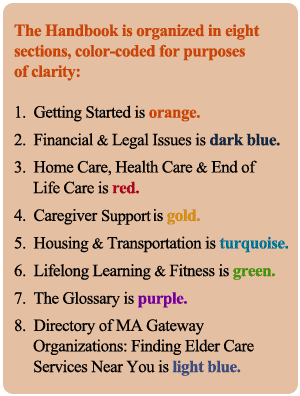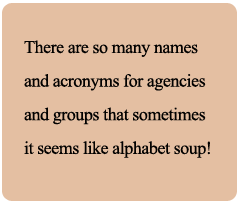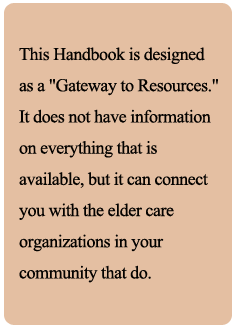If you are caring for an elder outside of Massachusetts—in other
words, you are a "long distance caregiver" — each section of this Handbook has a number of national organizations listed, and you will be able to find some information on services and resources in other states by contacting these groups.

Before you start looking for specific information and services, it is important to step back and figure out what are the major issues you need information on and what are some of the key questions you need to ask before making decisions.

Planning ahead is a luxury that many elder caregivers do not have, but most experienced caregivers say they wish they had started to prepare before facing an unanticipated crisis. If you are in the position to plan ahead, here are some key questions to ask:

Do I know where my parents'/spouse's/relative's important documents are located?

Do I know what their wishes would be if they were unable to make medical decisions?

What should I do if they can no longer manage their own finances?

Do we have the right medical and legal documents in place?
This Handbook provides information on key legal issues and resources for caregivers and elders, as well as financial planning.

It is common when first facing eldercare issues to feel overwhelmed and not know where to begin. The first step is to develop a care plan based on a careful assessment of current needs. But a plan is only as good as the information it is based on. Here are some key questions to ask:

How do I assess what kind of care is needed?

Once I understand the needs, what kind of services should I put in place?

What services will I need later?

Can I manage these services by myself?
What is needed will depend in part on whether your elderly relative has had a sudden health crisis, or a medical condition that is progressing such as dementia or vision deterioration, or if the needs for services are simply due to a normal process of aging that happens gradually. Once you determine whether or not there are physical or memory impairments, then consideration should be given to the kinds of assistance that are needed.
This Handbook has information on:

Services to help with daily personal care such as bathing, dressing, toileting, and medication supervision ;

Services to help with daily living such as meals, housework and laundry;

Transportation services for medical appointments and shopping;

Medical or home safety equipment, and emergency response monitoring;

Housing options that provide a supportive and safe place to live;

Services to help with organizing and monitoring home care.

Once you understand care needs, then comes the question of financing care services. One of the first things you confront as an elder caregiver are financial worries about how to make the best eldercare decisions without compromising your family's overall economic security.

What elder care services can we afford?

How can we find out if we are eligible for subsidized elder care services?

Whose assets are counted?

Is there any financial assistance for middle-income families?
The Handbook provides information to help think through issues of affordability, both for low-income and middle-income families. It explains eligibility guidelines for a variety of subsidized elder services, from home care to health care to out of home care.

Caregivers need support, almost as much as the elders they are caring for. Questions to ask yourself include:

How long can I keep this up?

How do I know when my own health is being compromised?

How can I overcome the daily isolation I feel?

What should I do when I feel I can't keep going?
This Handbook has information on a variety of caregiver support resources, including respite care programs such as out of home day care, as well as support groups and training opportunities.


This Handbook has been designed for a wide variety of family caregivers, including:

Those who need to plan for the eventuality of caring for a spouse, elderly parent, or other elderly relative

Those who are currently caring for an elder with minimal needs for assistance

Those who are caring for a chronically ill, or critically ill, elderly person
It is designed to useful for those who are just starting to care for an elderly person and for those who are experience caregivers. Most sections are followed by a list of resources to supplement what is explained in the text. There are two additional ways in which the Handbook has been designed to be user-friendly:
1. A picture of a tool box  tells you about a document that
will help you assess what you need, or help you do a specific task.
tells you about a document that
will help you assess what you need, or help you do a specific task.
2. The Glossary: If you find an unfamiliar name or an elder care term in any section, go to the Glossary, Section 7 for a definition.


The Internet has greatly expanded the information available about eldercare resources.
 In fact, there is a huge amount of good information on the Web about elder care.
In fact, there is a huge amount of good information on the Web about elder care.
If you are having trouble using the Web to access elder care information, you are not alone. Many people do not feel comfortable using the Web because it can be difficult to locate the information you want when you need it. Sometimes there is so much information, and so many different ways that websites are designed, that it gets very confusing.
The "good news" is — anyone who is interested can learn.
If you want to learn how to use the web, or if you want to develop your computer skills,
classes—some especially designed for seniors — are available at many Adult Education Centers across the Commonwealth. See Section 6, Part 1, for a listing of the Adult Education Programs in your area.
This Handbook simplifies the process of using the web in two ways:
1. It identifies some of the most useful elder care websites by topic and by community; and lists the address, or "URL", right in the text.
2. The text also provides the "navigation path" for you to reach information once you get to a website. The symbol > means put the cursor on the word that follows and click.
Internet URLs do change as websites are updated. If you find that a URL provided in this
site is not working, type the name of the organization into the search box on your Google or Yahoo page
and this will list links to the organization.


Over the past 50 years, the availability of elder care services has expanded greatly as a result of federal legislation. These increased services are highly beneficial, but there are so many names and acronyms for agencies and groups that sometimes it seems like alphabet soup!
It may be helpful as you read on to consult the Glossary: Elder Care Terms from A to Z, Section 7. Whenever a term or acronym is used that is unfamiliar, use the Glossary.
In Massachusetts, eldercare and caregiver services are delivered primarily
 through a combination of private and not-for-profit organizations serving different geographic regions. The state contracts with these organizations to deliver services, using both federal and state funds. You can also purchase services from private agencies if you do not qualify for subsidized care.
through a combination of private and not-for-profit organizations serving different geographic regions. The state contracts with these organizations to deliver services, using both federal and state funds. You can also purchase services from private agencies if you do not qualify for subsidized care.
The key purpose of this Handbook is to give current caregivers and future caregivers easy access to organizations that provide elder care services and information. The book does not have information on everything that is available, but it can connect you with the elder care organizations in your community that do have this information - in this way, the Handbook is designed as a "Gateway to Resources."
Here are the key gateway organizations that coordinate elder care in Massachusetts and provide access to a broad array of non-profit and for-profit agencies.


The Massachusetts Office of Elder Affairs oversees the network of non-profit and municipally delivered resources and services for elders and caregivers. It runs a statewide information number that can be accessed by calling, 1-800-AGE-INFO, or go to: www.800AgeInfo.com. You can find information on resources within your particular geographic area by calling this number or going to the web site.
The Office of Elder Affairs and the network of non-profit senior care agencies in Massachusetts
have created an elders website that you can find through the state's main web address: www.Mass.Gov
If you are a caregiver who is looking for caregiver support resources, here's what you do on the Internet:
1. Go to the home page for Massachusetts state government: www.Mass.Gov and click on "Residents."
2. This page lists 14 different topics starting with Labor and Employment; go to the second column and click on "Elders."
3. The "Elders" page lists twelve topics. Click on "Caregiver Support."
In this Handbook, these instructions will be shown as: www.Mass.Gov > Residents > Elders > Caregiver Support. Services listed on the state's website are provided by a combination of the state, private, non-profit and community organizations. You can also find information provided by state agencies and departments such as Housing, Health, Transportation, Secretary of State, and Attorney General at: www.Mass.Gov.


There are 27 of these agencies serving regions throughout the Commonwealth and they are known
in the network of elder care service providers as "A-saps." ASAPs are private, non-profit agencies with governing boards made up of at least 51% representation of people age 60 or older and appointed by the local Councils on Aging.
ASAPs are designated by the Massachusetts Executive Office of Elder Affairs (Elder Affairs) to coordinate services on behalf of the elders and caregivers in three major areas:
Information and referral (I&R): ASAPs provide free information about a wide range of elder care services and resources through trained I&R specialists. they also have trained volunteer counselors to provide health information through the SHINE program, which helps with medical billing problems, reducing insurance costs, and completing public benefits applications.
Services for the Elderly: The ASAPs coordinate services for the MA Home Care Program for elders who want to remain in their own home, but need assistance with activities of daily living. Elder Affairs is the primary funding source for these programs. Co-payments for services are based on a sliding fee scale. Core services include:

A comprehensive in-home assessment conducted by a case manager;

Development of a care plan which is reassessed regularly;

Home care services delivered through a network of subcontracted provider agencies.
Support for Caregivers: The ASAPs develop local programs for the MA Family Caregiver Support Program, including information and referral, counseling, training, support groups, and access to respite care. Caregivers are eligible for this program if they are caring for an individual 60 years or older.
Each ASAP serves a group of contiguous communities within a geographical area. see the Directory in Section 8, for contact information on the ASAP serving your city or town.


There are 348 Councils on Aging in Massachusetts serving the state's 351 cities and towns. These municipally appointed agencies range from small volunteer run programs to large multi-site elder service providers with a wide range of programs
 and services available. They are the front line for many elder services in your community. COAs have no regular funding and must get funds from either their municipal government, or private grants or donations. Volunteers are critical to the operation of the COAs, regardless of their size or scope of services.
and services available. They are the front line for many elder services in your community. COAs have no regular funding and must get funds from either their municipal government, or private grants or donations. Volunteers are critical to the operation of the COAs, regardless of their size or scope of services.
While each COA is unique to its community, most Councils offer information and referral, transportation, outreach, meals (congregate and home delivered), health screening, and fitness and recreation programs. Some COAs also provide health insurance benefits counseling (SHINE), food shopping assistance, telephone reassurance, friendly visiting and other in-home activities, peer support groups, supportive day care, pre-retirement programs, minor home repair, computer training, case management and intergenerational programs, among many other activities and services.
See the Directory, Section 8 for contact information on the COA serving your city or town. For more information about the Councils on Aging, you can visit the state associations' website at Mass Councils on Aging On Line, or call the Massachusetts Association of Councils on Aging office at 413-527-6425. The address is 116 Pleasant Street, Room 3109, Easthampton MA 01027-2740. E-mail: info@mcoaonline.com.

There are 23 of these agencies in Massachusetts, set up by the federal government to provide funding for
many of the eldercare services provided in your community by the ASAPs (Aging Service Access Points) described above.
Most "Triple A's" - as they are called - are also ASAPs, but there are three AAA's that are not: Boston Commission on the Elderly, Central Mass Elder Services, and the Old Colony Planning Council.
See the Directory, Section 8 for contact information on the AAA serving your city or town.


It is important to understand that these four gateway organizations are just a part of a complex elder care service delivery system in Massachusetts. These groups each have their own programs and services, but they are just some of the providers statewide.
The overall delivery system is a complex mix of non-profit and for-profit agencies and organizations. Some of the other kinds of groups include:

Hospitals with their own geriatric medicine departments and geriatric community service programs;

Rehabilitation facilities with their own inpatient services and community-based follow-up programs;

Out-patient centers linked to HMOs and community health clinics;

Industry trade associations and professional associations — representing hospitals, extended care facilities, home care agencies, geriatric care managers and others — that support their members and offer information and educational programs to the public;

Community agencies that serve a particular ethnic group or faith tradition, but are usually open to others outside that group or religion, and provide a range of services such as transportation assistance, home care, transportation and meals;